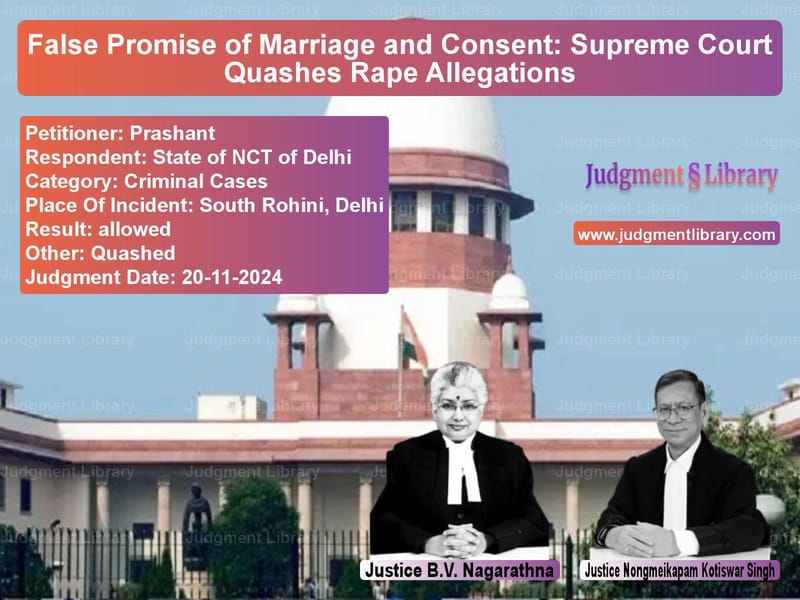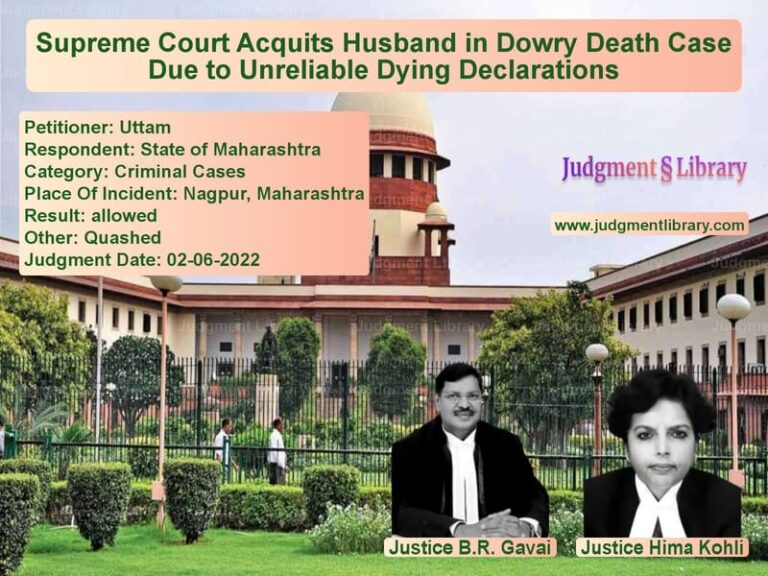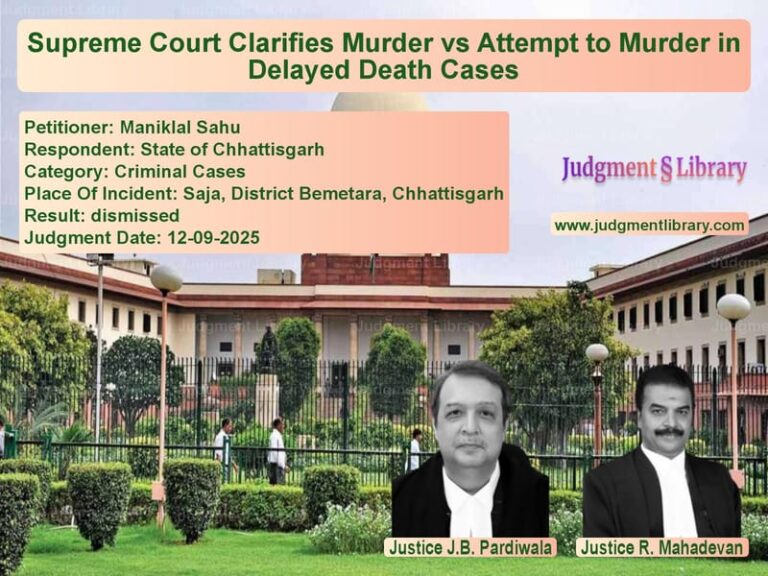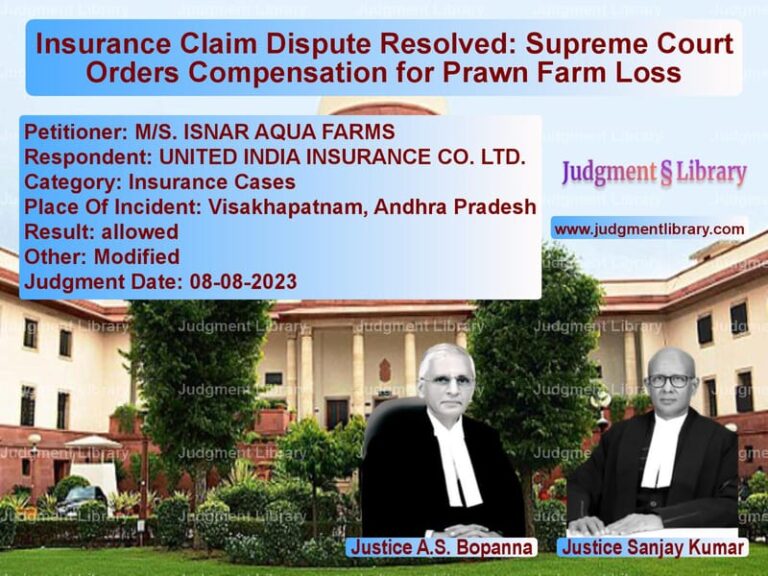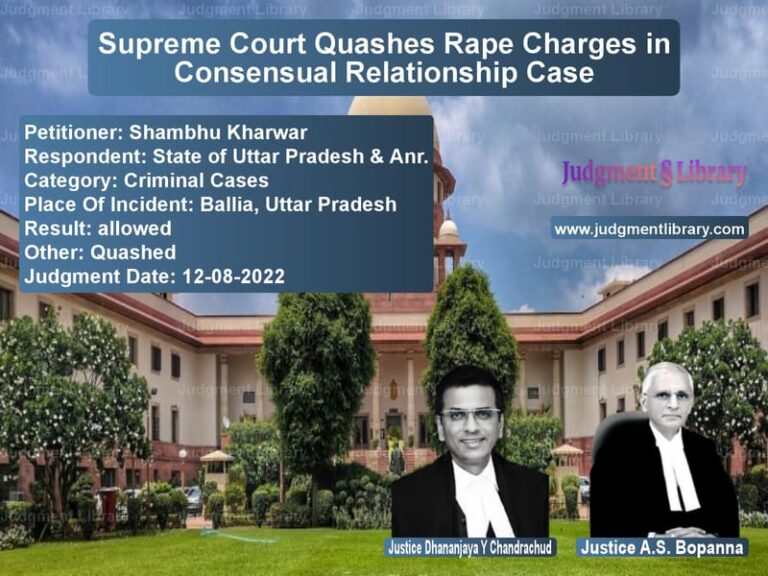False Promise of Marriage and Consent: Supreme Court Quashes Rape Allegations
The Supreme Court of India has delivered a significant judgment in the case of Prashant vs. State of NCT of Delhi, addressing the issue of consent in sexual relationships and allegations of rape under false promises of marriage. The ruling, pronounced on November 20, 2024, by a bench comprising B.V. Nagarathna and Nongmeikapam Kotiswar Singh, sets a precedent on how courts should analyze claims of sexual assault in relationships where both parties were consenting adults.
Background of the Case
The case arose from an FIR filed by the complainant against the appellant, Prashant, under Sections 376(2)(n) and 506 of the Indian Penal Code (IPC). According to the FIR, the complainant alleged that she met the appellant in 2017 and gradually developed a relationship. Over time, they met frequently and became physically intimate.
The complainant claimed that in January 2019, the appellant forcibly established sexual relations with her and continued to do so under the threat of harm. However, she also stated that they maintained their relationship for nearly two years and had intentions of marrying. It was only after the appellant married someone else in 2019 that she lodged a complaint in September 2019.
Arguments by the Parties
Petitioner’s Arguments
- The appellant, represented by his counsel, argued that the relationship was consensual, and the FIR was filed as an act of vengeance after the appellant’s marriage to another person.
- The counsel pointed out contradictions in the complainant’s statements in the FIR, medical examination report (MLC), and her deposition under Section 164 of the CrPC.
- The FIR alleged that the first instance of sexual assault occurred in January 2019, while the MLC report stated that the incident happened just a week before the medical examination in September 2019.
- It was emphasized that both parties were educated adults who voluntarily engaged in the relationship.
Respondent’s Arguments
- The Additional Solicitor General (ASG), appearing for the State, argued that the statements made under Section 164 CrPC sufficiently established the charges.
- The complainant alleged that she was coerced into a physical relationship under the false promise of marriage.
- Further, the appellant allegedly threatened to harm the complainant’s brother if she refused his advances, which led her to comply.
- The delay in lodging the complaint was justified due to the intimidation faced by the complainant.
Supreme Court’s Observations
The Supreme Court extensively analyzed the nature of the relationship between the appellant and the complainant and assessed whether the allegations constituted a punishable offense under Sections 376(2)(n) and 506 IPC.
Key Observations by the Court
- After reviewing the FIR and statements, the Court found that the complainant continued to meet the appellant voluntarily even after the alleged assault.
- The Court ruled that merely because a relationship does not culminate in marriage, it cannot be retrospectively converted into an allegation of rape.
- The complainant had willingly engaged in the relationship for two years, and there was no evidence to establish that the appellant had initially made a false promise of marriage.
- The Court relied on Pramod Suryabhan Pawar v. State of Maharashtra (2019), which clarified that for an allegation of rape under false promise of marriage, the promise must have been fraudulent from the outset.
- As both parties were educated adults and had mutually continued their relationship, the complainant’s claims lacked legal merit.
- The Supreme Court further noted that after filing the FIR, the complainant got married in 2020, while the appellant had already married in 2019, reinforcing the argument that the complaint stemmed from personal resentment rather than genuine legal grievances.
Legal Precedents Considered
The Court cited various judgments to support its decision, including:
- State of Haryana vs. Bhajan Lal (1992): Established guidelines for quashing criminal proceedings in cases of abuse of law.
- XXXX vs. State of Madhya Pradesh (2024): Stated that consensual relationships where both parties understand the consequences do not constitute rape.
- Pramod Suryabhan Pawar v. State of Maharashtra (2019): Clarified that an offense under Section 376 IPC cannot be established unless the promise of marriage was false from the beginning.
Final Judgment
The Supreme Court allowed the appeal, ruling that the continuation of criminal proceedings against the appellant would be an abuse of process. The FIR No. 272 of 2019, along with the charge-sheet and pending trial, was quashed. The Court held:
“A mere breakup of a relationship between a consenting couple cannot result in initiation of criminal proceedings. What was a consensual relationship at the initial stages cannot be given a color of criminality when it does not fructify into marriage.”
Implications of the Judgment
This ruling has far-reaching consequences for cases involving allegations of rape based on false promises of marriage. The judgment reinforces the principle that:
- Not every failed relationship should lead to criminal charges.
- Allegations must be scrutinized carefully to distinguish between genuine cases of exploitation and consensual relationships.
- Courts must be cautious about criminalizing personal disputes that arise due to failed relationships.
- The ruling provides legal clarity and safeguards individuals from wrongful prosecution.
This verdict serves as a benchmark for future cases, ensuring that the law is applied justly without being misused to settle personal grievances.
Petitioner Name: Prashant.Respondent Name: State of NCT of Delhi.Judgment By: Justice B.V. Nagarathna, Justice Nongmeikapam Kotiswar Singh.Place Of Incident: South Rohini, Delhi.Judgment Date: 20-11-2024.
Don’t miss out on the full details! Download the complete judgment in PDF format below and gain valuable insights instantly!
Download Judgment: prashant-vs-state-of-nct-of-delh-supreme-court-of-india-judgment-dated-20-11-2024.pdf
Directly Download Judgment: Directly download this Judgment
See all petitions in Bail and Anticipatory Bail
See all petitions in Fraud and Forgery
See all petitions in Judgment by B.V. Nagarathna
See all petitions in Judgment by N. Kotiswar Singh
See all petitions in allowed
See all petitions in Quashed
See all petitions in supreme court of India judgments November 2024
See all petitions in 2024 judgments
See all posts in Criminal Cases Category
See all allowed petitions in Criminal Cases Category
See all Dismissed petitions in Criminal Cases Category
See all partially allowed petitions in Criminal Cases Category

